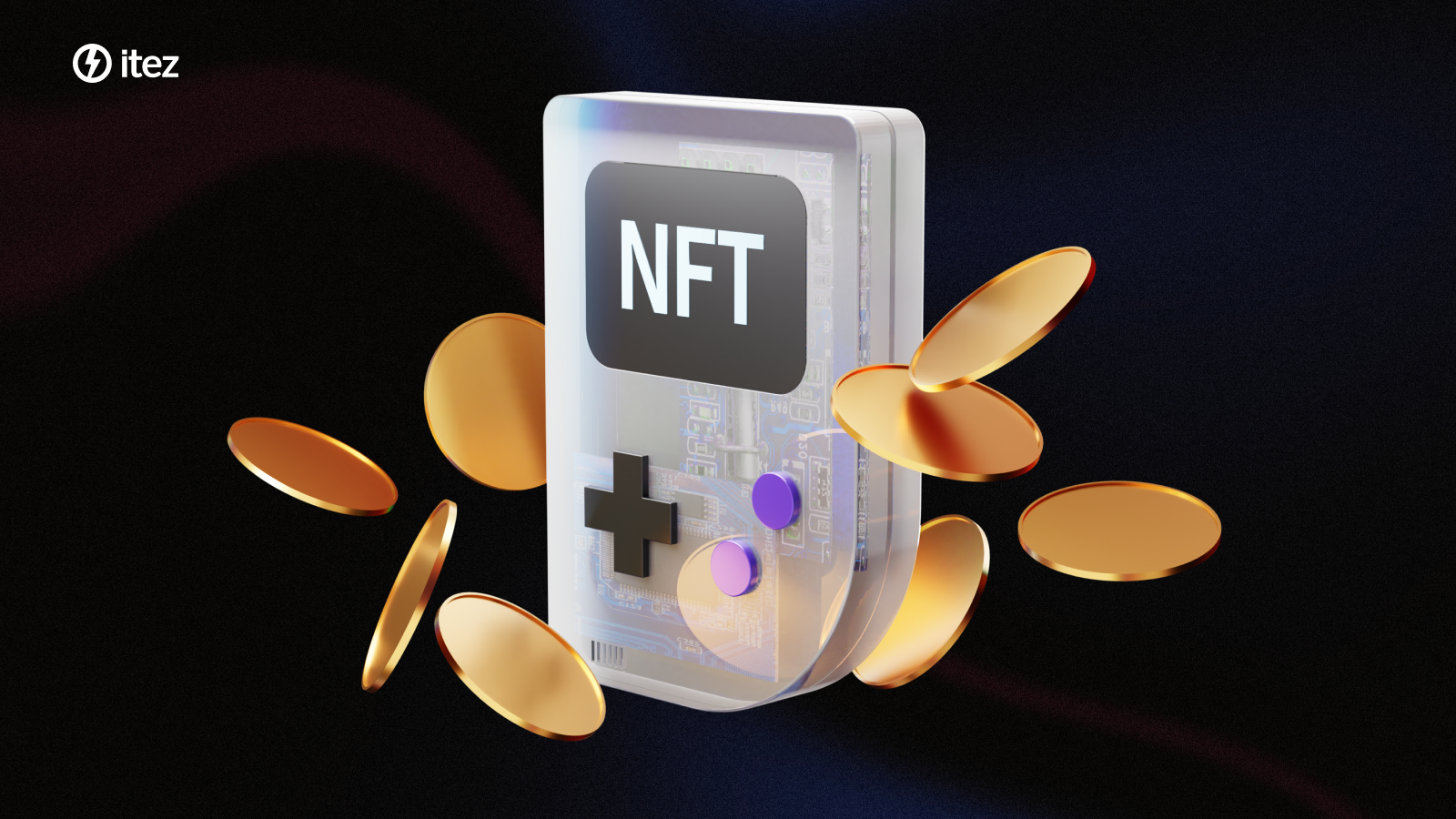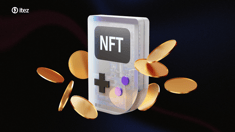
Almost everyone has dreamt at least once in their life of being paid to do what they love, whether it’s eating delicious food, travelling, or playing their favourite games. Some have already turned this dream into reality, and no, we’re not talking about professional esports players!
In this guide, the itez team has gathered the freshest and most exciting information about the Play-to-Earn (P2E) segment and NFT games.
Introduction to NFT games
Let’s begin our exploration of the thrilling world of NFT games, a relatively new concept that has already captured the interest of many within gaming communities worldwide.
What are NFT games?
NFT games are a new type of online game where in-game items, characters, and even entire virtual worlds are represented as unique non-fungible tokens (NFTs).
These games are a subset of the broader genre known as blockchain gaming. Blockchain games are built on blockchain technology, meaning both cryptocurrency gaming and NFT gaming belong to the expansive "family" of blockchain gaming.
NFT games have several distinguishing features that set them apart from other types of games:
Decentralisation: Any NFT game inherently falls under the genre of decentralised gaming. As discussed earlier, every NFT game is a subset of blockchain gaming and operates on a blockchain network.
This means that, thanks to the underlying blockchain technology, such games are not controlled by a single company. Instead, governance is in the hands of the player community.
Earnings: Additionally, NFT games, along with other members of the broader blockchain gaming genre, belong to the Play-to-Earn (P2E) segment. This is a new concept where players receive gaming rewards for their time and achievements in the game.
The conditions for earning can vary widely depending on the specific game’s plot and mechanics. For example, a player might earn rewards for completing tasks, winning competitions, creating valuable in-game items, and so on.
Digital Ownership: This aspect naturally follows from the previous one. Unlike traditional games where rewards are merely in-game assets, rewards in NFT games serve as interoperable assets, meaning that they have real value beyond the virtual world of the game.
For instance, a player who receives a reward can engage in NFT trading by selling or exchanging their tokens on external platforms like NFT marketplaces to earn money. Alternatively, they can become a collector, gathering NFT collectibles with the hope that their value will increase significantly over time or that they will become part of high art, much like other NFT art representatives such as the famous Bored Apes Yacht Club (BAYC) collection.
BAYC collection. Source: OpenSea
The rise of Play-to-Earn gaming
But how did P2E gaming even begin? Where did the idea originate that not only game creators but also ordinary players could earn money from games?
The concept began to emerge in the 2000s when players realised they could earn real money for in-game assets. At that time, players of MMORPGs like World of Warcraft farmed gold and sold it to other players for real money.
The surge in interest in the P2E segment started in 2017, thanks to the Ethereum blockchain and the game CryptoKitties. Ethereum expanded the possibilities of the P2E segment with its smart contracts, while CryptoKitties popularised NFTs and the Play-to-Earn model itself. In 2018, the launch of another game, Axie Infinity, took the internet by storm. It quickly became a phenomenon, attracting millions of players.
CryptoKitties website
After this sharp rise in popularity, there began to be cross-platform integration and experiments with various genres and models. Today, this gaming segment is still in its early stages of development.
How to get started with NFT games
If the idea of earning money by playing games appeals to you (and honestly, who wouldn't like that?), let's explore how to choose the right NFT game.
To ensure you're happy with your decision and potential earnings, start by asking yourself these questions:
1️⃣What genre of games do I enjoy the most?
Whether it's RPGs, strategy games, card games, or another genre, the options are vast. Pick a game you genuinely enjoy and are interested in playing.
2️⃣What kind of earnings am I expecting? What matters more: rewards or gameplay?
To answer this, you'll need to understand in-game economies. The gaming economy regulates the production, distribution, and exchange of game assets, represented as non-fungible tokens (NFTs).
The in-game economy varies across different games: it might be closed (controlled by the game developers) or open (driven by player demand and supply), and operate on a Free-to-Play (no initial investment needed) or Pay-to-Play (you need to pay to start) model.
To avoid disappointment, thoroughly review the game's rules, mechanics, and strategies before diving in.
3️⃣Does the game have an active community? What are the player sentiments?
You'll need to do some research. Dive into the social media presence of the game that caught your eye and assess how many active and engaged users are interested and trust the project. It might be a good idea to talk to a few players or read reviews to get their honest opinions on the game.
4️⃣What can be said about the game's developers? Do they have a plan for the future?
Again, dive into social media, but this time focus on the team behind the project. Check if there’s accessible information about them, how actively they manage their social media, and how they interact with the community.
Additionally, pay attention to the game’s official website. You can learn a lot by examining the roadmap to see if the project has long-term goals and how sustainable it is.
By considering these aspects, you'll be better positioned to choose an NFT game that aligns with your interests and expectations.
Managing your NFT assets
Before diving into your chosen game, there's one more crucial step: creating or connecting a cryptocurrency wallet. This tool will enable you to perform all the essential actions with the tokens you earn in the game:
- Storing them
- Exchanging them
- Selling them
You'll find all the necessary information on how to create, set up, and connect a wallet to manage your NFT assets in our step-by-step guide.
Top 5 NFT games in 2024
To make it easier to navigate the plethora of gaming options, we've narrowed down your search. Here, we’ll tell you about the top five NFT games of 2024.
Game 1: Axie Infinity
Game Overview: Axie Infinity is arguably the most popular game in the P2E segment, having brought significant attention to blockchain gaming when it launched in 2018.
This is a virtual world inhabited by unique creatures called Axies, each represented as an NFT. Axies vary in characteristics, with more desirable traits fetching higher prices.
The player's goal is to breed, train, and assemble armies of Axies to compete against other players in battles. Victories in these battles yield profits for the players.
NFT and Blockchain Integration: The main characters, Axies, are non-fungible tokens that can be a source of profit or collectibles. The game operates on the Ethereum and Ronin blockchains.
Why It's a Top Pick for 2024: Axie Infinity has remained relevant for six years, thanks to continuous updates and new gameplay features from the developers. Its sustained popularity and evolving gameplay make it a top pick for 2024.
Game 2: STEPN
Game Overview: STEPN is a mobile game that combines fitness with the Move-to-Earn model. Players are rewarded with the cryptocurrency GMT for engaging in physical activities such as walking, running, or other exercises, using special NFT sneakers.
The primary objective of STEPN is to encourage people to lead a healthier lifestyle. To achieve this, the developers have created a system where players can earn cryptocurrency through the app by staying active.
STEPN website
NFT and Blockchain Integration: The game is built on the Solana blockchain. The sneakers used in the game are NFTs, fully owned by the players. Additionally, STEPN has its own cryptocurrency, GMT, which is used for purchasing, upgrading, and trading within the game.
Why It's a Top Pick for 2024: STEPN uniquely blends fitness and gaming, motivating players to earn passive income while maintaining a healthy lifestyle. The developers continuously update and enhance the game, making it a compelling choice for 2024.
Game 3: Gods Unchained
Game Overview: Gods Unchained is a free-to-play collectible card game. Players can discover a multitude of cards, each with unique attributes and abilities. The game allows players to collect, craft, and trade cards representing gods, creatures, and spells from a fantasy world.
The goal is to build the strongest deck possible to defeat other players. The emphasis is on strategy and skill, requiring players to carefully plan each move to achieve victory.
NFT and Blockchain Integration: All cards in Gods Unchained are NFTs, fully owned by the players. Additionally, players can earn the project's cryptocurrency, $GODS, by winning tournaments.
Why It's a Top Pick for 2024: Players have full digital ownership of their tokens, meaning they can collect or resell them on NFT marketplaces. Furthermore, Gods Unchained is a fully decentralised game, eliminating the potential for cheating or manipulation by the project team.
Game 4: DeFi Kingdoms
Game Overview: DeFi Kingdoms is a fantasy online role-playing game with elements of RPG and strategy. Players interact with character cards represented as NFTs, all set against a unique pixel art backdrop.
The objective is to earn various cryptocurrencies, including the governance token JEWEL, by participating in diverse in-game activities such as staking, providing liquidity, and engaging in battles.
NFT and Blockchain Integration: The game operates on the Harmony blockchain. It also features an integrated decentralised exchange (DEX) where players can trade their cryptocurrencies and NFTs.
Why It's a Top Pick for 2024: Developers continuously add new content and features, keeping user interest high. Additionally, the game offers multiple ways to earn through NFTs and cryptocurrencies, making it a versatile choice for players.
Game 5: My Neighbor Alice
Game Overview: My Neighbor Alice is a multiplayer social simulation game that allows users to develop digital lands.
The objective is to cultivate their digital plots as NFTs and interact with a multitude of other players. Players can trade items, resources, and services with each other, generating revenue in the process.
NFT and Blockchain Integration: The game operates on the Ethereum blockchain. All in-game items, lands, and houses in My Neighbor Alice are NFTs, owned entirely by players. Trading occurs using ALICE, the game's native cryptocurrency.
Why It's a Top Pick for 2024: My Neighbor Alice is straightforward and accessible to all players, regardless of their familiarity with NFTs, blockchain, and cryptocurrencies. Its emphasis on communication and player interaction creates a friendly community atmosphere, making it an attractive choice for gamers.
The future of NFT games
The future of NFT games, much like the future of any young industry, cannot be predicted with absolute certainty. One thing is certain— the Play-to-Earn industry will continue to evolve, change, and attract new users worldwide.
It's already evident that games in the P2E sector, and NFT games in particular, have already transformed the gaming industry. They have introduced many innovations:
- Created a new gaming economy where players can own in-game assets and monetize their gaming achievements.
- Made the gaming industry more inclusive and appealing, allowing users from developing countries to join such games and earn real money.
As for the future direction of development, it's hard to say for sure, but we can already see emerging trends in blockchain gaming:
- Integration with Web 3.0, the next-generation internet. The use of technologies like decentralised applications (dApps) and the concept of limitless metaverses expands the horizons of the games' virtual worlds.
- Emergence of artificial intelligence and machine learning. These cutting-edge technological solutions significantly enhance all the internal mechanics of the game, from creating non-player characters (NPCs) with artificial intelligence to crafting more dynamic, vivid, and visually appealing worlds.
Conclusion: embracing the NFT gaming revolution
In conclusion, NFT games offer an excellent opportunity to earn additional income and enjoy quality leisure time.
It's impossible to predict the future of the entire Play-to-Earn sector and the blockchain gaming industry right now—all we can do is watch closely. And to stay updated on all important news on this and many other topics, don't forget to regularly read our itez blog!
🤔 So, are you now eager to create a crypto of your own? Share your views in our socials!
💌 Telegram, Twitter, Instagram, Facebook
Here are three other cool articles:
How people make millions in crypto: 5 stories of lucky breaks
What is Binance Smart Chain? A comprehensive guide to BSC
Understanding protocols: the backbone of digital communication
This article is not investment advice or a recommendation to purchase any specific product or service. The financial transactions mentioned in the article are not a guide to action. It’s not intended to constitute a comprehensive statement of all possible risks. You should independently conduct an analysis on the basis of which it will be possible to draw conclusions and make decisions about making any operations with cryptocurrency.








